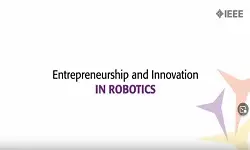-
Members: FreeRAS
IEEE Members: Free
Non-members: FreeLength: 00:26:04
01 Jun 2017
Video Description?
The promise of oceanic discovery has intrigued scientists and explorers for centuries, whether to study underwater ecology and climate change, or to uncover natural resources and historic secrets buried deep at archaeological sites. A robotic avatar could go where humans cannot, while embodying human intelligence and intentions through immersive interfaces. In collaboration with KAUST, MEKA Robotics, we developed Ocean One, a bimanual force-controlled humanoid robot. With the support of French Ministry of Culture’s Underwater Archaeology Research Department, we deployed Ocean One in an expedition in the Mediterranean to Louis XIV’s flagship Lune, lying off the coast of Toulon at ninety-one meters. In the spring of 2016, Ocean One became the first robotic avatar to embody a human’s presence at the seabed. We foresee that robotic avatars will search for and acquire materials, support equipment, build infrastructure, and perform disaster prevention and recovery operations — be it deep in oceans and mines, at mountain tops, or in space.
ICRA-X 2017
ICRA-X is an outreach activity to the general public in the region that hosts the IEEE International Conference on Robotics and Automation (ICRA) by the IEEE Robotics and Automation Society. It will feature lively presentations from distinguished experts on popular and cutting-edge topics in the field. ICRA-X is aimed at enlightening the greater community, especially the young generation.
Speaker
Oussama Khatib received his PhD from Sup’Aero, Toulouse, France, in 1980. He is Professor of Computer Science at Stanford University. His research focuses on methodologies and technologies in human-centered robotics including humanoid control architectures, human motion synthesis, interactive dynamic simulation, haptics, and human-friendly robot design. He is a Fellow of IEEE. He is Co-Editor of the Springer Tracts in Advanced Robotics (STAR) series and the Springer Handbook of Robotics, which received the PROSE Award for Excellence in Physical Sciences & Mathematics. Professor Khatib is the President of the International Foundation of Robotics Research (IFRR). He has been the recipient of numerous awards, including the IEEE RAS Pioneer Award in Robotics and Automation, the IEEE RAS George Saridis Leadership Award in Robotics and Automation, the IEEE RAS Distinguished Service Award, and the Japan Robot Association (JARA) Award in Research and Development.
The promise of oceanic discovery has intrigued scientists and explorers for centuries, whether to study underwater ecology and climate change, or to uncover natural resources and historic secrets buried deep at archaeological sites. A robotic avatar could go where humans cannot, while embodying human intelligence and intentions through immersive interfaces. In collaboration with KAUST, MEKA Robotics, we developed Ocean One, a bimanual force-controlled humanoid robot. With the support of French Ministry of Culture’s Underwater Archaeology Research Department, we deployed Ocean One in an expedition in the Mediterranean to Louis XIV’s flagship Lune, lying off the coast of Toulon at ninety-one meters. In the spring of 2016, Ocean One became the first robotic avatar to embody a human’s presence at the seabed. We foresee that robotic avatars will search for and acquire materials, support equipment, build infrastructure, and perform disaster prevention and recovery operations — be it deep in oceans and mines, at mountain tops, or in space.
ICRA-X 2017
ICRA-X is an outreach activity to the general public in the region that hosts the IEEE International Conference on Robotics and Automation (ICRA) by the IEEE Robotics and Automation Society. It will feature lively presentations from distinguished experts on popular and cutting-edge topics in the field. ICRA-X is aimed at enlightening the greater community, especially the young generation.
Speaker
Oussama Khatib received his PhD from Sup’Aero, Toulouse, France, in 1980. He is Professor of Computer Science at Stanford University. His research focuses on methodologies and technologies in human-centered robotics including humanoid control architectures, human motion synthesis, interactive dynamic simulation, haptics, and human-friendly robot design. He is a Fellow of IEEE. He is Co-Editor of the Springer Tracts in Advanced Robotics (STAR) series and the Springer Handbook of Robotics, which received the PROSE Award for Excellence in Physical Sciences & Mathematics. Professor Khatib is the President of the International Foundation of Robotics Research (IFRR). He has been the recipient of numerous awards, including the IEEE RAS Pioneer Award in Robotics and Automation, the IEEE RAS George Saridis Leadership Award in Robotics and Automation, the IEEE RAS Distinguished Service Award, and the Japan Robot Association (JARA) Award in Research and Development.


